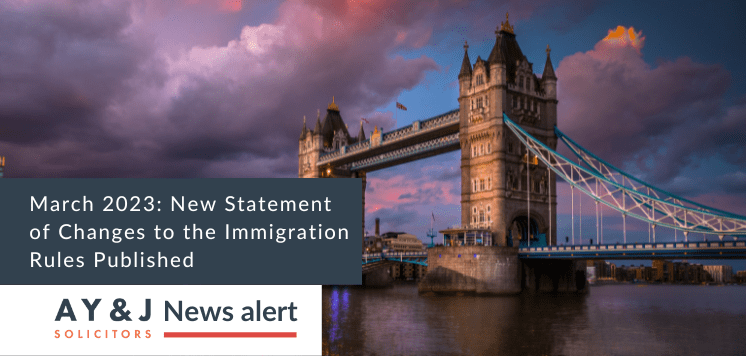On 9th March 2023, a Statement of Changes to the Immigration Rules was presented to Parliament, containing several key immigration changes, many of which will come into force from 12th April 2023. These include the new UK border electronic travel authorisation (ETA), the replacement of the Innovator visa and retirement of the Start-up visa, and amendments to the salary thresholds for sponsored work visas. In this article, we will outline five of the key proposed changes to the immigration rules.
Change 1: New Electronic Travel Authorisation (ETA) scheme
The new Electronic Travel Authorisation (ETA) scheme will require travellers to gain pre-authorisation before travelling to the UK. The scheme will apply to third-country nationals who are visiting the UK or transiting through the UK who do not currently require a visa when coming for a short stay.
As the Home Office website explains, an ETA will grant permission to travel to the UK, and it will be electronically linked to the holder’s passport.
With an ETA, travellers will be permitted to:
- Come to the UK for up to 6 months for tourism, visiting family and friends, business or study
- Come to the UK for up to 3 months on the Creative Worker visa concession, or
- Transit through the UK to another country.
British and Irish passport holders, passengers with permission to live, work or study in the UK, and those with visas to enter the UK will not need an ETA before travelling.
The new UK ETA scheme will be phased in from November 2023 for those from certain countries, as follows:
- From 15th November 2023, Qatari nationals will need an ETA to enter the UK
- From 22nd February 2024, nationals of the following countries will need an ETA to enter the UK: Bahrain, Jordan, Kuwait, Oman, Saudi Arabia, and the United Arab Emirates.
Further details on the new UK ETA scheme, including the application process and fees, will be released by the Home Office in due course in ‘Appendix Electronic Travel Authorisation’.
Change 2: The new Innovator Founder route
The changes include proposals for a new Innovator Founder visa route to replace the existing Innovator visa. This new visa will open to applications on 13th April 2023 and will see the closure of the Start-up visa.
The aim of the new Innovator Founder visa is to make it easier for those with an innovative, viable, and scalable business idea to come to the UK. The main difference between the new scheme and the outgoing Innovator visa route is that applicants will no longer need £50,000 in upfront investment funds.
As the statement explains, the new visa aims to provide more “flexible provision for those with a genuine proposal for an innovative business and sufficient funds to deliver it”.
In addition to removing the £50,000 investment fund requirement, the new visa will relax the rules on allowing work in secondary employment, but only for skilled roles (i.e. RQF Level 3 or above).
Change 3: Updates to employment requirements for UK work visas
The statement of changes incorporates a number of proposed amendments to the Skilled worker visa, Global Business Mobility visa scheme, Scale-up visa, and the Seasonal Worker visa, as follows:
Skilled Worker, Global Business Mobility, Scale-up and Seasonal Worker visas
- Updates to the salary thresholds and going rates for individual occupations based on the latest available UK salary data (see below for further details)
- Clarification on how salaries are considered if the applicant is working irregular shift patterns (i.e. where their hours are not the same in each shift). The proposed new rules state that where the regular hours are not the same each week, resulting in uneven pay:
- (a) work in excess of 48 hours in some weeks can be considered towards the salary thresholds providing the average over a regular cycle – which can be less than, but not more than, 17 weeks is not more than 48 hours a week; and (b) any unpaid rest weeks will count towards the average when considering whether the salary thresholds are met; and
- (c) any unpaid rest weeks will not count as absences from employment for the purpose in relation to the grounds for visa cancellation due to absence from employment.
- E.g. an applicant working 60 hours a week for £12 per hour for two weeks, followed by an unpaid rest week, will be considered to work 40 hours a week on average and have a salary of £24,960 (£12 x 40 x 52) per year
Skilled Worker visa
- Clarification that the route includes those working in UK waters as set out in section 43 of the Nationality and Borders Act 2022
- Salary threshold changes:
- £26,200 is the new general annual threshold (Option A)
- £23,580 is the new general annual threshold (Option B)
- £20,960 is the new general annual threshold (Option C, D and E)
- £10.75 per hour is the new hourly threshold
Global Business Mobility Scheme
- As agreed in the UK – Australia Free Trade Agreement, Australian nationals and permanent residents coming to the UK to open a branch or subsidiary of their Australian employer will not need to demonstrate that they have worked for their overseas employer for 12 months before coming to the UK.
- Salary threshold changes:
- £45,800 is the new general annual threshold for Senior or Specialist workers and Expansion workers (GBM) (note – there is no change to the high earners threshold).
Scale-up visa
- Salary threshold changes:
- £34,600 is the new earning threshold for scale-up visas
- Transitional arrangements apply for those showing earnings for an extension
Worker routes
- Clarification that work visa applications will be refused if the offered job does not comply with the UK’s National Minimum Wage Regulations or the Working Time Regulations
- Jury service and attending court as a witness are being added to the list of valid reasons for absence from sponsored employment when assessing the continuity of employment
- Applicants in some sponsored routes will be allowed to change their occupation code as part of a graduate training programme (without making a change of employment application).
Change 4: Youth Mobility Scheme
Following changes to the UK’s bilateral youth mobility arrangement with New Zealand, the age range applicable under the Youth Mobility Scheme (YFS) for NZ nationals is being expanded from 18-30 to 18-35. In addition, the maximum length of stay is being increased from 2 to 3 years.
Change 5: Indefinite Leave to Remain – Long Residence
Under the changes to the rules for ILR long residence:
- Any period on immigration bail will not count towards the qualifying period for long residence in any circumstances.
- Time as a visitor, short-term student and on the seasonal worker routes will not count towards long residence (i.e. where permission is granted for no more than 12 months and switching to another visa type is not permitted).
- Anyone who has spent a period of time on immigration bail or as a visitor (or other temporary permission) who is later granted permission on another basis will still be able to qualify for long residence ILR, but they will need to wait longer to do so, as time spent on these routes does not count towards the 10 year qualifying period.
A Y & J Solicitors is a specialist immigration law firm with extensive experience with all types of visa applications. We have an in-depth understanding of immigration law and are professional and results-focused. For assistance with your visa application or any other UK immigration law concerns, please contact us on +44 20 7404 7933 or at contact us today. We’re here to help!









